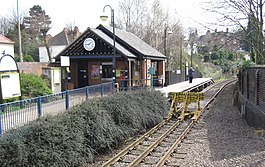Stourbridge Town railway station
| Stourbridge Town |
|
|---|---|

Stourbridge Town railway station.
|
|
| Location | |
| Place | Stourbridge |
| Local authority | Dudley |
| Coordinates | 52°27′18″N 2°08′31″W / 52.455°N 2.142°WCoordinates: 52°27′18″N 2°08′31″W / 52.455°N 2.142°W |
| Grid reference | SO904842 |
| Operations | |
| Station code | SBT |
| Managed by | London Midland |
| Number of platforms | 1 |
| DfT category | E |
| Live arrivals/departures, station information and onward connections from National Rail Enquiries |
|
| Annual rail passenger usage* | |
| 2011/12 |
|
| 2012/13 |
|
| 2013/14 |
|
| 2014/15 |
|
| 2015/16 |
|
| Passenger Transport Executive | |
| PTE | Transport for West Midlands |
| Zone | 5 |
| History | |
| Original company | Stourbridge Railway |
| Pre-grouping | Great Western Railway |
| Post-grouping | Great Western Railway |
| 1 October 1879 | First station opened |
| 29 March 1915 | Closed |
| 3 March 1919 | Reopened |
| 18 February 1979 | Resited |
| 10 January 1994 | Closed |
| 19 April 1994 | Reopened on third site |
| National Rail – UK railway stations | |
| * Annual estimated passenger usage based on sales of tickets in stated financial year(s) which end or originate at Stourbridge Town from Office of Rail and Road statistics. Methodology may vary year on year. | |
|
|
|
Stourbridge Town is a railway station near the centre of Stourbridge, West Midlands, England. It is situated at the end of a short branch line linking the station with Stourbridge Junction just 0.8 miles (1.3 km) away, where passengers can change for mainline train services. It is said to be the shortest operational branch railway line in Europe.
Opened to passenger traffic on Wednesday 1 October 1879, Stourbridge Town was built because it was considered that the existing station at Stourbridge Junction was situated too far from Stourbridge town centre. The original station, situated upon the site now occupied by Stourbridge bus station, was a surprisingly grand affair, with one 298 ft (91 m) platform and substantial brick buildings covered by a full-length awning. The station was closed as a wartime economy measure between 1 April 1915 and 28 February 1919, with passenger services being replaced by Midland Red buses. During the General Strike in 1926, the bus service between Junction and Town stations was re-introduced from 7 May to 10 July to cover for the withdrawn train services.
The station and branch were listed for closure under the Beeching axe, but won a stay of execution in 1965, although the station became unstaffed from July 1967. The 1879 station survived mostly intact until February 1979 when it was demolished. Some of the material from the old station was saved and used for buildings at Tyseley Locomotive Works.
In 1979, the branch was cut back by 70 yards (64 m) towards Junction station, leaving room for a bus station. The new station was a low-cost portable building built by British Rail.
...
Wikipedia
